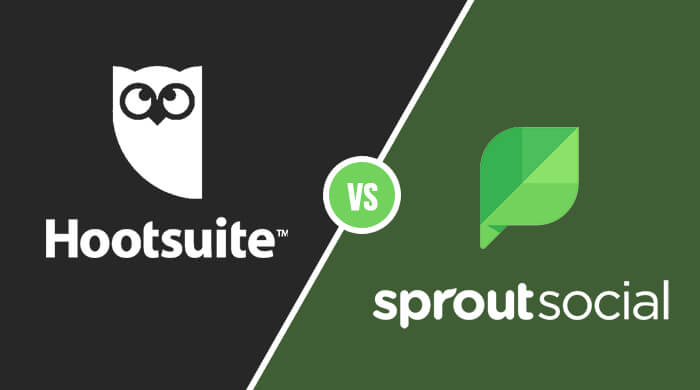Social media marketing is one of the most personalized and cost-effective ways of reaching out to your target audience worldwide. People are not only using social media platforms for personal networking but are also using them for discovering different brands and shopping online. Thus, if you don't have a strong social media presence, you might be missing out on gaining leads and sales, which can eventually help you in growing your business.
Thus, implementing a robust social media marketing strategy that includes engaging content becomes highly significant for businesses to attract their audiences and convert them into their customers. For that purpose, businesses use a social media marketing software that helps them to optimize their social media profile, post engaging content, and measure their performance to gain desired results.
Social media marketing is tricky, and gaining success in this endeavor might seem to be easier said than done. Besides choosing the right social media marketing tools, it is also important to select the appropriate social media platforms on which you would like to promote your brand. There are many social media platforms available like Facebook, Linkedin, Instagram, Twitter, etc., and with more than 30 social media sites in existence today, which ones will be perfect for your business needs might become critical to decide.
This article provides in-depth information about different social media platforms that can help you execute the right social media marketing strategy enabling you to maximize your brand reach, boost awareness, generate qualified leads, and gain more conversions.
Before we delve into the features, pros, and cons of top social media platforms, let us go through the basic information about social media marketing and how it can help businesses improve their online presence.
What is Social Media Marketing?
Social media marketing makes use of the popularity of prominent social media platforms to meet a company's marketing and branding objectives. It is the process of creating content for social media sites to promote your products or services, create a community that involves your target audience, and drive traffic to your website.
Social media marketing is continuously evolving, with new features and platforms emerging every day. It also includes paid advertising, where you can pay and run targeted ads to have your brand appear in front of your target audience. Every social media platform offers incredible targeting features that allow you to invest your time and money on exactly the kind of users that are most likely to be converted into your customers.
Social media marketing demands an evolving strategy with measurable goals and requires the following:

Let us now go through how social media marketing is benefiting businesses in this cut-throat competitive, and disruptive market.
How Can Social Media Marketing Benefit Businesses?
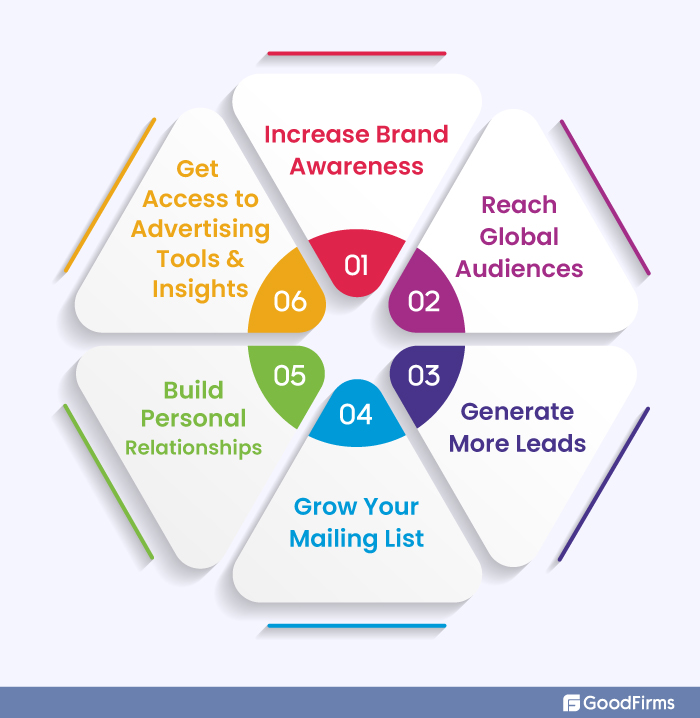
1. Increase Brand Awareness
Platforms like Facebook, Instagram, or Twitter are ideal places to reach new and highly targeted potential clients because more than half of the world's population uses these social media platforms. On social media, individuals not only interact with brands they already know but also are eager to explore new products and brands. This can be manifested by the fact that 83% of Instagram users claim to discover new products on the site.
Engaging in social media activity makes you stand out and keeps you on top of people's minds. You're likely to attract more interested consumers once your brand has received adequate exposure.
2. Reach Global Audiences
In 2021, there were around 4.26 billion social media users, which is likely to increase to almost six billion in 2027. Social media has the power to accelerate the growth of your company significantly. Having a social media presence can instantly provide you the capacity to reach the greatest possible amount of potential clients or audiences, regardless of the type of business you are in. Social media platforms allow your business to reach people across the globe and expose your brand to audiences beyond your geographic boundaries.
3. Generate More Leads
Potential clients can express interest in your company and your products via social media in a quick and low-commitment manner. Since generating leads is such a crucial benefit of social media for businesses, several social networks offer ad types made expressly for doing so.
Social networks will be more crucial for product search, and e-commerce as the number of individuals utilizing social media keeps expanding and social sales tools are transforming consistently.
4. Grow your Mailing List
Social media is a fantastic place for increasing website traffic for your business. When you create compelling content, you can divert your social media audience to your website, where they can learn more about your business. You can eventually use this traffic to expand your email list and boost overall earnings by creating continuous campaigns using email marketing software.
5. Build Personal Relationships
Social media marketing is one of the few techniques that enable you to communicate directly with your audience. You can present more valuable and relevant content in front of your target audiences when you are completely familiar with their needs. You may individually answer their queries, handle them one-on-one, and enhance your brand reputation in the process. Social media platforms provide the opportunity to engage with your followers, get to know them and provide top-notch customer service.
6. Get Access to Advertising Tools and Insights
You have the choice to run paid adverts if you want to do more than just post organically. Every social media site has its own paid advertising option. You can customize your adverts on social media sites so that they show up in the feeds of users who are interested in your goods and services.
Moreover, you can easily track the impressions, clicks, and conversions of your campaign on each platform to determine whether it is generating worthwhile results or not, and keep on changing your efforts till you achieve your desired goals.
Now, when we know everything about social media marketing and its endless benefits, the question remains how to maximize your brand reach with market-leading social media platforms. So, here you go with in-depth details about the top 8 social media platforms with their pros and cons helping you to implement the right social media optimization strategy for your business, gain more conversions and expand your business globally.
Best Social Media Platforms for Maximizing Business Reach
#1 Facebook
One of the prominent social media sites in the world, Facebook has over 2.93 billion daily active users. It has emerged as one of the greatest methods to identify your target market, create an email list, and acquire new clients. You can engage with clients and provide essential details about your company, products, and services, as well as future events, by creating a Facebook business page. As of June 2022, users aged 25-34 years represent Facebook’s largest audience, making it one of the best platforms for businesses that target millennials.
How Can Facebook Help in Promoting Your Business?
- Use Facebook Insights to keep an eye on your competitor’s pages and compare engagement, activity, and audience growth.
- Export your Facebook page insights data for business analytics.
- Select the ‘News Feed Targeting’ setting on the ‘Write Something’ field to determine your desired niche audience.
- Install Facebook pixel for retargeting in ads.
- Find out the best time to post in the Insights section.
- Through the multiple ad sets feature, create more than one ad at a time in the same campaign.
- Leverage Facebook Response Assistant to send instant replies to users who send queries on your page.
- Use the ‘Page to watch’ section under Insights to keep an eye on competitors’ page performance.
Pros and Cons of Facebook for Business:
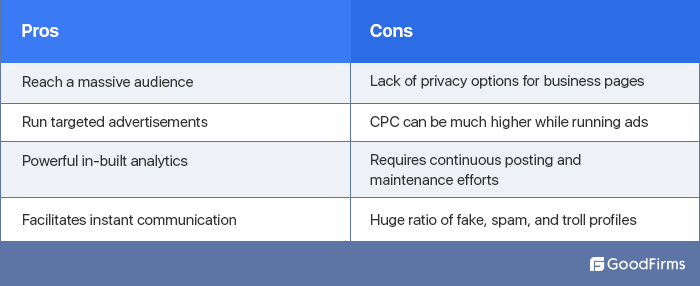
Platform Tip: Facebook is a tool that practically any business can use. Paid advertisements allow you to reach your niche audience within your desired budget. It is best to keep your page active to stay in touch and communicate with users.
#2 Instagram
Within 2 months of its launch, Instagram had over a million users. This number has now grown to 1 billion monthly active users, making it one of the top social media platforms for business. Along with its own set of benefits, Instagram offers the same user base and advertising platform as Facebook.
Whether you want to build a community, create brand awareness, or even generate e-commerce sales, Instagram can help you achieve all your significant business goals. Instagram’s research reveals that 70% of shoppers use the platform to research their next purchase. Thus, combined with ads, Instagram is a great place for running a brand awareness campaign.
How Can Instagram Help in Promoting Your Business?
- Convert the Instagram account into a business account and get access to the professional dashboard to track performance and access all insights in one place.
- Set up an Instagram shop to showcase your products on your profile and allow your audience to shop directly from the app.
- Identify trending topics and create reels that are relevant to your business.
- Make the most out of stories to interact with your followers on a regular basis.
- Go live and conduct Q&A sessions to educate your audience about your brand, generate leads, build a community, and boost Instagram engagement.
- Use Live Rooms to host talk shows with influencers, hold Q&A sessions, or a webinar with a group of industry experts.
- Develop your own AR filters to drive awareness, engage users, go viral, and start trends.
Pros and Cons of Instagram for Business:
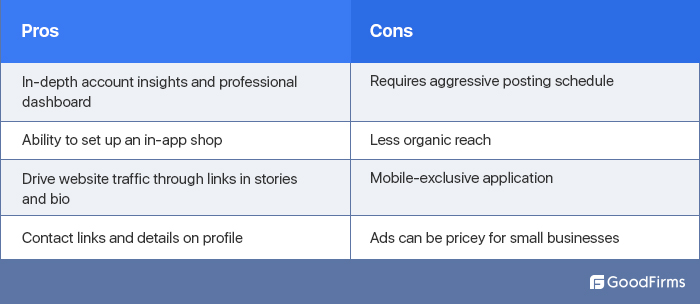
Platform Tip: Instagram can prove to be a great platform for businesses having a younger target audience who typically shop using their mobile devices. Utilize the “Checkout” feature, enabling customers to see product photos and purchasing directly from their Instagram accounts.
#3 LinkedIn
Linkedin is a powerful networking tool exclusively for professionals and has revolutionized how people seek, find, and get hired for jobs. It is the first ever social platform developed for professional connections and B2B businesses. With more than 300 million monthly active users, it is a great source for sharing informative content and building a personal brand.
LinkedIn has 15x more content impressions than job postings, which clearly states the scope of publishing informative content and creating thought leadership. LinkedIn can be crucial for your business when your business targets consumers based on job titles or follows a B2B model.
How Can Linkedin Help in Promoting Your Business?
- By creating Lead Gen Forms on Pages, you can add a form to your company page with customized text and a call-to-action, through which your page visitors will be able to submit their contact information.
- Publish articles on the LinkedIn pulse to provide your audience with informative content.
- Broadcast content to an audience in real-time using LinkedIn Live.
- Create a LinkedIn event to boost the visibility of your online and offline events and get more people to sign up.
- Add important posts and documents to your profile using the ‘Featured’ section.
- Use LinkedIn Scheduler to manage your interviews and meetings more efficiently.
- Create polls to drive quick engagement and gain insights into your connections.
Pros and Cons of LinkedIn for Business:
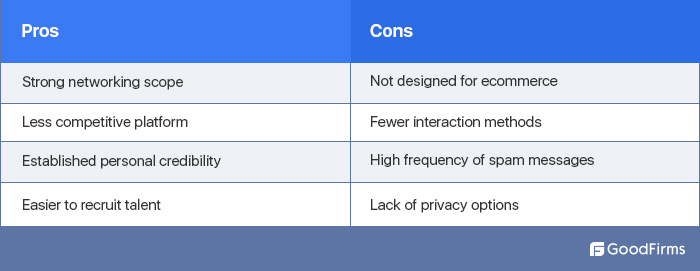
Platform Tip: LinkedIn is a platform where users want to learn more about their industry, get updates from their professional contacts, and look for new career opportunities. Thus, businesses should focus on sharing valuable and informative content related to their industry on their LinkedIn company page.
#4 Twitter
One of the oldest social networking platforms, Twitter has 336 million monthly active Twitter users. This is a fleeting platform where people share real-time updates and news. Businesses, journalists, government authorities, and even celebrities use Twitter to share stories, news articles, or humorous anecdotes daily. With a professional Twitter profile, you can customize your bio and inform people about your business. As almost half of Twitter’s audience consumes news regularly on the platform, it offers a great space to regularly share industry news and updates.
How Can Twitter Help in Promoting your Business?
- Host a Twitter chat on a subject related to your brand or expertise or participate in another trending conversation to continuously interact with like-minded people.
- Gain valuable consumer insights and monitor your account’s performance through the in-built analytics.
- Make use of the newly launched pilot version of Shop Module, which enables brands to create shoppable profiles and showcase their products on the top of their profile.
- Utilize Twitter Spaces to host or join audio conversations relevant to your industry.
- Create or join Twitter Communities that allow members to start conversations or ask questions on certain topics, giving businesses opportunities to build and share industry knowledge.
- Use Quick Promote to sponsor your content smartly via Twitter ads without having to go through the campaign creation process.
- Schedule your tweets in batches from the platform itself to keep your account active throughout the day.
Pros and Cons of Twitter for Business:
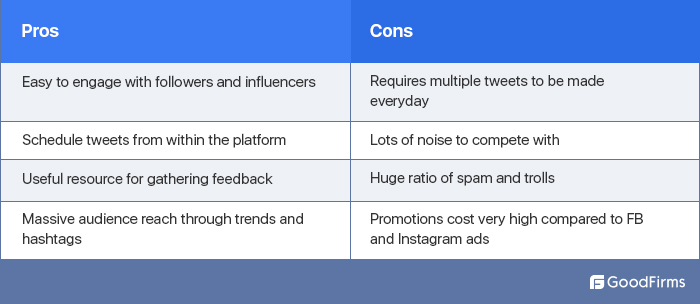
Platform Tip: Depending on your social media for marketing goals, Twitter may be a potent tool for increasing brand recognition and establishing direct contact with clients and influencers. Remember that Twitter requires a unique marketing approach, and you'll need to prepare several tweets each day.
#5 YouTube
YouTube has surpassed all of its competitors (Instagram, Facebook, and TikTok) as the platform for exchanging information via video. It is the world’s second most visited website, currently boasting 361 million daily active users, and has established itself as a center for education as well as entertainment, making it such a potent tool for businesses. You can produce video tutorials to support your written content (like blogs), graphically display product descriptions, or provide users with private press releases.
How Can YouTube Help in Promoting Your Business?
- Try utilizing software to insert a link midway through your videos to invite viewers to input their email addresses and subscribe to your channel so they can keep viewing your material. This enables you to build an email list too.
- With Google AdWords for Video, you can advertise on videos that your audience is more likely to watch and search for to gain laser-focused access to them.
- Regularly producing videos provides you the chance to use Google's AdSense for Video program to make some money from your videos.
- You boost your chances of appearing in Google search results and enhancing your own rankings by regularly using YouTube for your business.
- YouTube Studio offers a channel dashboard, analytics, insights, comment filters, and other tools that can help transform your strategy.
- Use YouTube Cards to direct traffic to your website from the videos or even add interactive features such as polls.
Pros and Cons of YouTube for Business:
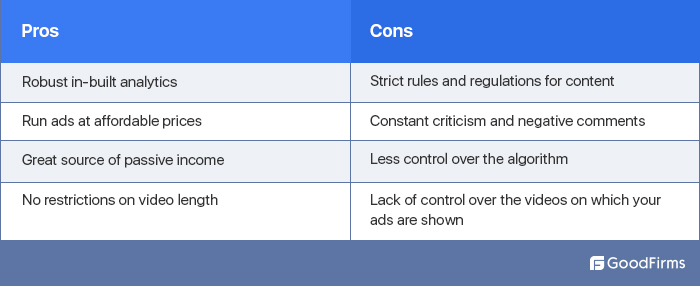
Platform Tip: Create educational content around your niche, and keep in mind to optimize your titles and descriptions for YouTube SEO, and you will be well on your way to driving traffic and conversions to your website.
#6 Pinterest
Pinterest is a social media network you want to be on if your company is in the creative sector in any way or if it primarily targets women. Some of the most popular searches on Pinterest are food recipes, lifestyle how-to articles, wedding inspiration, and fashion ideas. Gen Z users continue to grow on Pinterest, currently making up nearly 21 million users, making it the perfect platform for businesses selling visual products or services targeted at such audiences.
The number of keywords in a post and whether or not they correspond with a user's Pinterest search influence the organic reach of a post. This allows companies to deliberately organize their content so that it includes keywords often searched on Pinterest.
How Can Pinterest Help in Promoting your Business?
- The ‘Slideshow for collections’ feature grabs products from your catalog and converts them into an automatically generated, attention-grabbing collections ad. This feature helps you easily create video-like hero content that’s dynamically generated and personalized to every shopper.
- Use the ‘merchant details’ field on your profile to showcase your brand values like “responsibly sourced,” “invested in good,” or “inclusive.”
- Verify your account to get access to Pinterest analytics and track how your account is performing.
- Add the ‘Pin it’ button to your website that allows Pinterest users to pin your content to their boards directly from your website.
- As Pinterest is a search engine, make sure your business’s pins are easy to find in a search by including keywords in your Pins’ descriptions, on boards, and in hashtags too.
- Your brand's boards can assist in reaching new Pinners interested in certain topics or gaining specialized knowledge because 97% of Pinterest searches are unbranded.
Pros and Cons of Pinterest for Business:
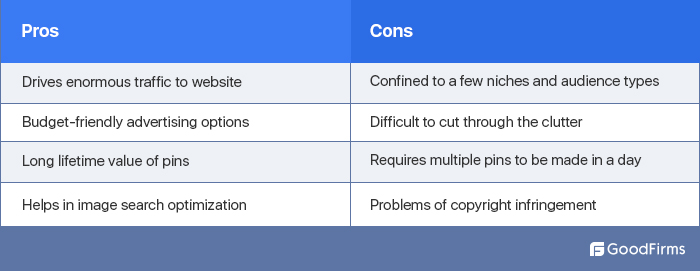
Platform Tip: Pinterest may be a fantastic source of website traffic, but it works better for certain businesses than others. Businesses that can succeed on Pinterest include those that deal with home furnishings, cooking techniques, photography, fashion, and travel.
#7 TikTok
Essentially the second iteration of Musical.ly, TikTok has garnered a huge audience globally in mere six years. The platform offers user-recorded videos of 15 and 60 seconds in length that may be edited within the app and integrated with the other top social networks. The majority of TikTok users are between the ages of 16 and 24.
TikTok has developed from a video-creation tool simply intended for people to express their creativity to a marketing and advertising paradise since its introduction in 2018. TikTok enables marketers to interact with people via video, but only in short, bite-sized segments. As it has created a lot of hype among the teens of the world, over 20% of industry professionals have increased their usage of TikTok to run marketing campaigns.
How Can TikTok Help in Promoting your Business?
- Use a laid-back, less commercial approach for creating content, as the platform has earned a reputation as a casual site where users feel comfortable expressing themselves with raw content.
- Participate in TikTok challenges, find out the trending songs, and create your own branded version of the same.
- Use TikTok's ‘Hashtag Challenge Plus’ in-app shopping function, which enables users to explore merchandise linked to a sponsored hashtag without leaving the app.
- Create branded effects (e.g., games, stickers, filters, special effects) that your followers can use in their videos.
Pros and Cons of TikTok for Business:
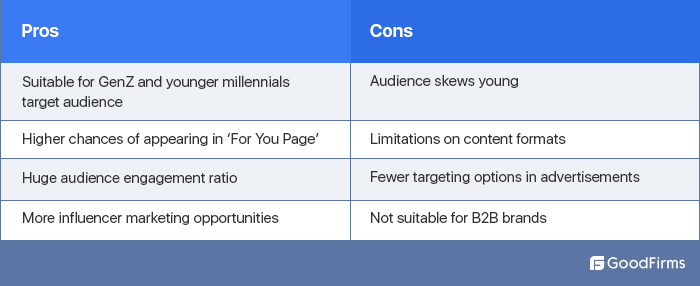
Platform Tip: TikTok is mostly focused on entertaining content that is popular among GenZ users. So, try to create videos that are informative as well as entertaining at the same time. A quick way to grow on the platform and create brand awareness is by collaborating with micro-influencers.
Comparison of the Top Social Media Marketing Platforms in 2022

Now that you are aware of the major social media platforms and their pros and cons let us have a look at some tips that can help you make the most out of your social media marketing efforts.
11 Tips to Leverage Social Media Platforms for Business
1. Identify Your Target Audience
The collection of information on present customers is advantageous for businesses. This data reveals who is making purchases and how they are interacting with a business online.
When it comes to B2B marketing, you need to define your target market based on characteristics like industry size, number of employees, geographic location, and annual sales. Whereas, for B2C companies, identifying target customers is based on their personas, including age, gender, education, financial status, etc.
Startups and beginners in this field naturally have to make more effort to gain the attention of their target audience compared to the advanced marketers who already have a defined set of followers and fans on their business pages.
Identifying the right audience also depends on the industry your business falls under. For example, a company in the fashion industry is likely to reach its target audience through sites like Facebook and Instagram. And a SaaS business will have clients that spend more time on LinkedIn. As each social network attracts a different audience, businesses should invest their efforts where their target audience spends their time.
2. Decide Which Platforms are Right for You
According to the data collected in the planning stage, you need to identify the social media platforms that will be beneficial for your business. There is no need to take an all-or-nothing stance when selecting your platforms. You can utilize multiple social media profiles to connect with various audiences or to accomplish various business objectives.
Major social media sites for businesses include Facebook, Twitter, Instagram, and LinkedIn. But there is also a place for other platforms, like Pinterest and YouTube, when it comes to promoting or advertising products.
For B2B businesses, LinkedIn might prove to be the best platform as it focuses more on building professional relationships and generating inbound leads. While for B2C businesses, platforms like Facebook and Instagram can prove to be the best bet.
3. Tell Your Brand’s Story
People's perceptions of your brand are greatly influenced by how you present it. Successful storytelling has been a strategy used by well-known companies for the success of their brand promotion. The emotional bond between your business and the target audience is constantly facilitated by stories.
In addition to what and how you say it, it's crucial to consider the media through which your brand tells its narrative. Your business will be able to keep a high engagement rate by consistently posting stories, videos, testimonials, interviews, and interesting facts on relevant social media platforms.
When your business is targeting other businesses, it is ideal for focusing on creating stories that speak about the mission and vision, success stories, interviews, and the like.
4. Create and Publish Content Consistently
Consistency is the key to growing your presence on social media platforms. Consistent posting not only strengthens the brand but also fosters client loyalty. There will certainly be more opportunities for word-of-mouth marketing as a result of followers sharing and discussing the brand.
You can also make use of user-generated content - which allows your target audience to receive honest feedback from other customers. This is a type of social proof that enhances the trustworthiness of your brand. Spend time creating smart content that adds to your audience's feeds instead of simply posting every day just for the algorithm, especially if you're just starting out.
Establishing thought leadership through content is mainly important for B2B businesses. 75% of potential buyers say that it helps them curate their vendor shortlist. Even for B2C, episodic content is a great way to keep people engaged and wanting more, and it is worth taking time to come up with unique content series that your audience will love.
5. Leverage Social Media Marketing and Automation Tools
From responding to the community, and developing connections, to producing fresh content, marketers have a lot on their plates. However, there are ways to save time, such as by using marketing automation software and scheduling tools.
When you are just beginning with social media posting, the frequency of your posts might be less. However, as you begin posting regularly on multiple social media platforms, creating a content calendar will help in consistently uploading content. Once you have it in place, you can create your social posts beforehand and use scheduling tools to make them live on your social media accounts automatically.
Professional social media marketers can also consider other automation, including the usage of chatbots, which can send out automated texts when someone reaches out to your business. These texts can direct users to FAQs or other support sections while they await a reply from a representative.
6. Monitor and Follow Trends
In the continuously changing landscape of social media platforms, it is crucial for marketers to stay on top of trends. Every social media site optimizes its presentation of content, algorithms, and posting rules on a continuous basis. Monitoring and adapting these changes allows businesses to get their content in front of the right target audience.
For example, current social media marketing trends for B2C businesses include creating reels, collaborating with influencers, etc., while more and more B2B businesses are focusing on creating audio content like podcasts and offering industry information through social channels.
If you are a beginner in social media marketing, you need to ensure that the content posted resonates with your brand image and audience interests. You can also make use of trending hashtags in your posts, which can help you reach more users and attract followers. Advanced marketers use the top social networking software that allows them to gain insights needed to create and update content that engages the audience.
7. Interact Consistently with Followers
Social media is a two-way street. Simply posting consistently will not suffice. Users on social media are more interested in brands that communicate to their followers and answer their queries quickly. As social media platforms enable you to talk directly to your audience and followers, you can easily build strong relationships over time.
For beginners, some ways to start engaging with your followers on a regular basis include responding to their comments, retweeting and reposting relevant content, sharing user-generated content, responding to reviews and complaints, and asking for feedback.
Advanced marketers go one step ahead and use social media listening tools to monitor and track conversations on social sites and websites about brands, including their own. This data can be used to reach out to people who are looking for products and services similar to what you are marketing. It also helps you to introduce your target audience to your brand and solve your present customer queries even if they have not tagged your social media handle.
8. Track and Refine your Performance
It is essential to keep track of what works and what does not when you execute your social media marketing efforts. It will enable you to fine-tune your efforts and improve results. Almost every social media platform offers an insight section where you can analyze your audience behavior, well-performing posts, growth of your account over time, and much more.
The metrics that you should monitor depend upon your business type and goals. You might choose to focus on response time, impressions, engagement rate, conversions, sales, qualitative reviews, or customer satisfaction rankings.
Who follows your page, what kind of posts get more engagement and the time when your audience is actively scrolling through the platform are all metrics that can be tracked to create better social media marketing strategies.
9. Make Use of Short-Form Video Content
54% percent of marketers say that video is the most valuable content type for achieving their social media goals, and for a good reason. Video content on social media is booming, especially with the rise of TikTok and Instagram Reels. Short-form video content will continue to dominate the social space across all social sites due to its high engagement rate.
These days many companies are also using branded hashtag challenges, which involve Tik Tok users creating videos for brands. It turns Tik Tok users into your brand ambassadors in a very innovative way. Other videos that businesses can create include product teasers, behind-the-scenes videos, educational videos, and customer feedback videos.
10. Run Targeted Advertisements
Apart from creating organic content, social media can be well used to reach your target audiences by running advertisements. While B2C businesses can ideally utilize Facebook, Instagram, and Twitter to promote their products or services directly to their target audience, B2B businesses need to utilize different platforms for specific purposes. For B2B marketers, Facebook Ads are ideal for promoting whitepapers, webinars, and other similar lead generation content; Twitter ads can be used to spread brand awareness, and LinkedIn Ads can be used to generate qualified leads.
11. Use Chatbots
Chatbots are a great digital tool that can communicate round-the-clock with your customers and resolve their queries without requiring any human involvement. Chatbots can now easily be integrated into your social media accounts, enabling you to serve your consumers where they feel most comfortable and spend considerable time. These chatbots can answer customer questions, take orders directly from Facebook Messenger and comments, and integrate with all major payment systems.
When you have just started with social media marketing, customers can be handled manually as there will be fewer queries. However, as you grow and establish your presence on multiple platforms, chatbots can enhance your customer service and provide quick interactive responses.
So, these are the different ways you can promote your brand on social media platforms effectively. But, you also need to future-proof your social media marketing strategy. For that purpose, let us have a look at some latest trends that impact the future of social media marketing.
The Future of Social Media Marketing
The usage of social media platforms is bound to increase in the coming years. Social media is no longer limited to a few applications with newsfeeds and static adverts. New technologies have made it possible for customers and companies to interact through a variety of channels. In the near future, the following social media trends will be seen:
- More Video Content: Consumer engagement tactics for video content are developing quickly. For instance, TikTok is well known for its short, impromptu films, which are very well-liked by the younger generation. Thousands of videos from every imaginable type of business are available on other platforms, such as Instagram and YouTube.
- Micro-Influencers: Through sponsored posts in which a business collaborates with or pays an influencer to talk about or promote a product or service, social media influencers give marketers a means to get their brands in front of customers. Brands have started looking out to collaborate with influencers having 10000-150000 followers that belong to their industry. Micro-influencers' popularity will continue to grow in the future as they tend to have a more engaged audience.
- Artificial Intelligence: Marketers will use artificial intelligence (AI) to enable computers to make judgments that are comparable to those made by humans without direct human intervention. This technology makes it feasible to give tailored, personalized information that is not attainable with conventional marketing strategies. AI will eventually be integrated with social media for enhanced functionality and features. Chatbots will function just like people and appear more human.
- Augmented Reality: Customers will be able to use augmented reality to test out products and see how they appear graphically. For instance, if they want to buy sunglasses from a social media account/ seller, they may try them on to see how they appear virtually. It will aid them in making wiser decisions and purchasing directly from their social media accounts.
Apart from all the trends that social media might experience in the near future, the metaverse will greatly change how people utilize social media platforms. Let’s have a look at the role that metaverse will play in shaping the future of social media marketing.
Role of MetaVerse in the Future of Social Media Marketing
For investors, advertisers, and other participants, the metaverse is ushering in a new era of the internet, which presents opportunities, challenges, and concerns. According to MetaMetric Solutions, real estate transactions on the four major metaverse platforms will total $501 million in 2021. The producer of metaverse data reported that sales in January exceeded $85 million. At this rate, revenues might reach over $1 billion by 2022.
There hasn't been a shortage of news articles highlighting celebrity and institutional investor interest in the industry since Facebook's shocking revelation of its rebranding to Meta and its pivot to the metaverse. In fact, PWC estimates that the value of the metaverse might reach USD 678.8 billion by 2030.
How Will Metaverse Impact The Future Of Social Media For Business?
The objective of online shopping is to offer a totally immersive experience in keeping with the metaverse's atmosphere. In order to overcome the gap between the virtual and physical worlds, the metaverse can use virtual reality to make customers feel as though they were truly walking through a store. They can converse with staff members and receive incredibly personalized experiences.
With AR, these experiences can be augmented even further so that customers can browse catalogs, pick up items, and interact with content that is placed on actual landscapes. Additionally, the metaverse may present prospects for an NFT-based payment option.
It's critical that brands make investments in specific tools and technology if they want to remain prepared for this futuristic change. Moreover, the use of social media for business has already transformed the way people shop online. AR/VR experiences, omnichannel marketing, social commerce, and AI-driver analytics are some of the tactics that businesses are following and gaining traction from.
Final Thoughts
When it comes to maximizing your brand reach using social media sites, the best ones include Facebook, Instagram, Twitter, LinkedIn, YouTube, and Pinterest. Many other social media platforms like Reddit, Quora, Snapchat, and TikTok can be used according to your target audience’s presence.
However, if you are just getting started or wish to deal with the least but best platforms, the above list is a great place to begin your social media marketing efforts. If consistent posting on multiple social platforms seems overwhelming, you can use social media management software to automate and schedule your posts on numerous social accounts together.
Regardless of the platforms you choose, the above-mentioned tips will help you create a social media marketing strategy that maximizes your brand reach, drives traffic to your website, increases sales, and lets you stay ahead of the competition. They will enable you to engage, educate, and excite customers at the right place and at the right time!






